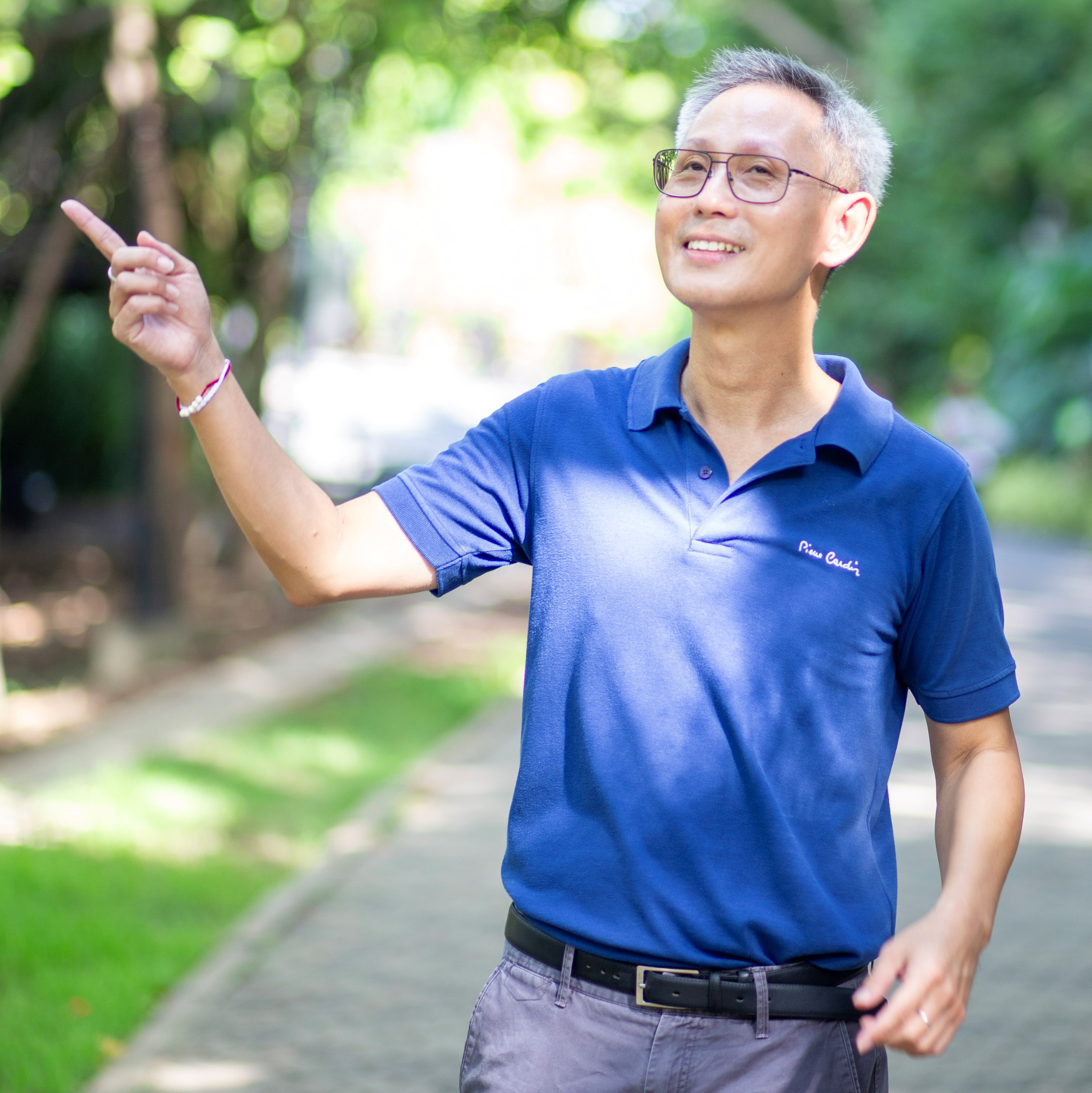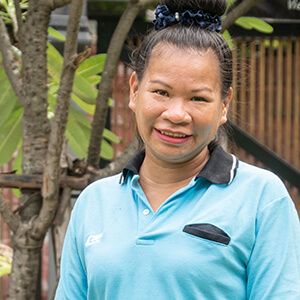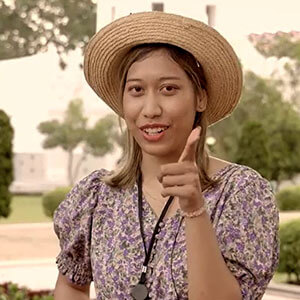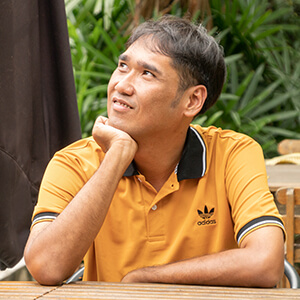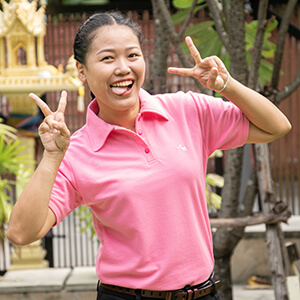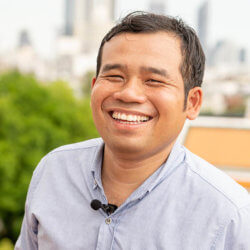Your Complete Guide to Experiencing Bangkok Like a Local
About Guide Ticha
Guide Ticha brings fresh perspectives to Bangkok tours with her enthusiasm for sharing authentic Thai culture. Based on client feedback, she’s particularly skilled at explaining Buddhist traditions, navigating Bangkok’s complex transportation system, and finding hidden local gems. Her expertise covers everything from temple etiquette to street food adventures, making her an ideal choice for first-time visitors seeking genuine cultural experiences.
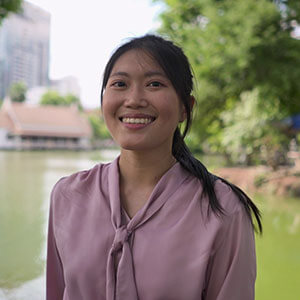
Patthicha ‘Ticha’ Sinaudomphaisan
Tour Guide License No. 1-034630
1. Cultural Mistakes & Temple Etiquette
Q: What’s the biggest cultural mistake first-time visitors make?
A: The most common mistake is inappropriate dress when visiting temples. Many visitors arrive in shorts or sleeveless tops and are surprised when they’re denied entry.
Essential Temple Dress Code:
- Cover shoulders and knees completely
- Remove shoes before entering temple buildings
- Avoid tight or revealing clothing
- Bring a light scarf to cover shoulders if needed
- No hats or sunglasses inside temple buildings
Popular Temples with Strict Dress Codes:
- Grand Palace & Temple of the Emerald Buddha (Wat Phra Kaew)
- Wat Pho (Reclining Buddha)
- Wat Arun (Temple of Dawn)
- Wat Traimit (Golden Buddha)
Pro Tip: Many temples provide sarongs or coverings for rent, but arriving properly dressed saves time and shows respect.

2. Unwritten Social Rules in Bangkok
Three Essential Rules Every Tourist Should Know:
Tuk-Tuk Negotiations
- Always negotiate the price before getting in, tuk-tuks don’t have meters like taxis
- Expect to pay more than taxis for the experience
- Be wary of “special deals” that usually include gem shops or other stops
Mind Your Feet
- Never point feet at people, Buddha images, or sacred objects
- Don’t step on thresholds in temples
- Keep feet on the ground when sitting, avoid pointing soles toward others
- Remove shoes before entering homes, temples, and some shops
Public Transportation Etiquette
- Always queue in line for BTS Skytrain and MRT
- Stand on the right side of escalators, leave left clear for people in a hurry
- Keep noise levels low on public transport
- Offer seats to monks, elderly, and pregnant women
- Let passengers exit first before boarding
3. Neighborhoods: Where to Go & What to Avoid
Areas to Approach with Caution (for first-timers):
- Patpong & Nana districts – heavy nightlife, can be noisy and crowded
- Areas during rush hour (7-9 AM, 5-7 PM) – extreme traffic congestion
- Tourist trap areas with persistent and pushy vendors
Hidden Gems Beyond Guidebooks:
- Talad Noi – Street art and historic shophouses in old Chinatown
- Bangkok Yai – Authentic canal-side life and local temples
- Artist’s House at Khlong Bang Luang – Traditional puppet shows and riverside community culture
- Wang Thonglang area – Local markets and authentic neighborhood life
- Thonburi canals – Traditional Bangkok lifestyle along the waterways
Client Insight: One traveler who stayed in Nana found the nightclub noise made sleep impossible. Choose accommodations based on your lifestyle preferences.

4. Transportation: Avoiding Time & Money Wasters
Biggest Mistake: Underestimating Bangkok traffic and relying solely on taxis/tuk-tuks during peak hours.
Smart Transportation Strategies:
Best Options by Situation:
- Long distances during rush hour: BTS Skytrain or MRT
- River crossings: Chao Phraya Express Boat
- Short distances/experience: Tuk-tuk (negotiate first)
- Convenience with fixed pricing: Grab app
- Late night/early morning: Taxi (insist on meter)
Transportation Costs (Approximate):
- BTS/MRT: 15-65 THB per journey
- Express Boat: 10-40 THB per stop
- Tuk-tuk: 100-300 THB (negotiated)
- Taxi: 35 THB start + meter
- Grab: Upfront pricing, typically competitive
Time-Saving Tips:
- Plan routes using BTS/MRT maps
- Avoid taxi/tuk-tuk during 7-9 AM and 5-7 PM
- Use river boats for Wat Arun, Grand Palace area
- Download transportation apps: Grab, BTS/MRT apps
5. Dietary Restrictions & Food Safety
For Allergies:
- Communicate clearly with vendors through your guide
- Ask chefs to clean kitchenware first for serious allergies
- Double-check ingredients when food arrives
- Stick to simple dishes to avoid hidden allergens
- Carry allergy cards in Thai (your guide can help prepare these)
For Vegetarians & Vegans:
- Seek dedicated vegetarian restaurants when possible
- Regular restaurants often have vegetarian menus
- Be aware of fish sauce and shrimp paste in many Thai dishes
- Buddhist temple areas often have excellent vegetarian options
Recommended Food Experiences:
- Street food in Chinatown (Yaowarat)
- Local markets like Khlong Lat Mayom
- Pak Klong Talad flower market food stalls
- Tipsamai for famous pad thai
- Riverside restaurants along Chao Phraya
6. Thai Festivals & Cultural Events
Major Festivals Visitors Often Miss:
Loy Krathong (November)
- Floating decorated baskets on rivers and canals at night
- Honors the water goddess with deeply spiritual significance
- Best viewing spots: Chao Phraya River, Lumphini Park
- Cultural importance: Merit-making and releasing negative energy
Songkran (April 13-15)
- Thai New Year water festival – nationwide celebration
- More than just water fights – includes temple visits, merit-making
- Cultural activities: Almsgiving, family gatherings, blessing ceremonies
- Experience: Join locals without language barriers through shared celebration
Festival Impact on Travel:
- Public transport gets crowded
- Some attractions may close
- Heavier than usual traffic
- Amazing cultural experiences if you plan around them
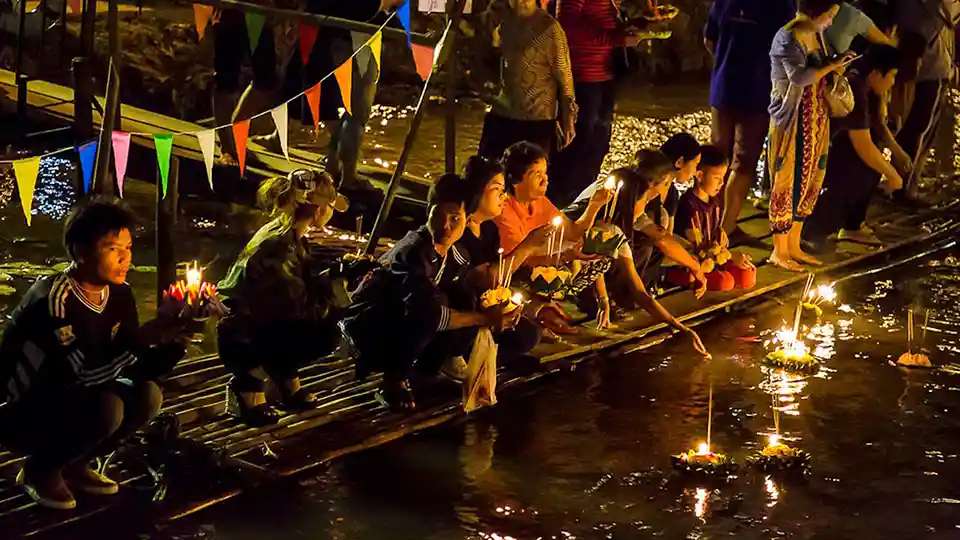
7. Authentic Low-Cost Cultural Experiences
Morning Almsgiving with Monks (5:45 AM – 8:00 AM)
What it involves:
- Buy simple offerings from local markets (rice, fruit)
- Join the morning ritual at sunrise
- Experience Thai spiritual practice firsthand
- Connect with community life and daily rhythms
Cultural Significance:
- Merit-making tradition believed to bring good luck
- Not a tourist show but living religious practice
- Opportunity to understand Buddhist culture deeply
Where to Experience:
- Local temples in residential areas
- Wat Saket (Golden Mount) area
- Thonburi side temples
- Ask your guide for authentic, non-commercialized locations
8. Avoiding Tourist Scams
Common Bangkok Scams & Prevention:
Before Accepting Any Service:
- Always check and confirm prices upfront
- Be skeptical of “special deals” or claims attractions are closed
- Politely decline and stay calm when pressured
- Ask hotel staff or locals for second opinions
Transportation Scams:
- “Grand Palace is closed” tuk-tuk drivers – usually false to take you elsewhere
- Gem shop detours – avoid tuk-tuks offering tours that include shopping
- Overpriced taxi rides – insist on using the meter, or use Grab service instead
Safe Alternatives:
- Use Grab app for transparent pricing
- Take BTS/MRT when possible – fixed pricing
- Book tours through reputable guides like Your Thai Guide
- Use official taxi stands at major hotels
9. How Local Holidays Impact Your City Tour Bangkok
Positive Impacts on city tour Bangkok:
- Cultural celebrations like Songkran and Loy Krathong offer unique experiences
- Festival atmosphere throughout the city
- Local participation opportunities in traditional activities
Potential Challenges:
- Crowded public transportation during festivals
- Some attractions may close on major holidays
- Heavier traffic than usual
- Hotels and tours book up faster
Planning Tips:
- Book guides and accommodations early during festival periods
- Check temple schedules for holiday closures
- Embrace the experience rather than fighting crowds
- Plan alternative indoor activities for peak crowd times
10. Understanding Bangkok’s Daily Rhythm
Key Insight: Bangkok is home to millions of people with daily routines that affect visitors.
Rush Hour Reality:
- Morning: 7:00-9:00 AM
- Evening: 5:00-7:00 PM
- Traffic can add 1+ hours even to short journeys
Optimal Timing:
- Early morning (6:00-8:00 AM): Temples, exercise, almsgiving
- Mid-morning (9:00-11:00 AM): Tourist attractions, shopping
- Afternoon (2:00-4:00 PM): Indoor attractions, massage, food courts
- Evening (5:00-7:00 PM): River transport, sunset viewing
- Night (8:00 PM+): Markets, street food, cultural shows
Transportation Strategy:
- Master the BTS and MRT systems, game-changers for mobility
- Use river boats for scenic and efficient transport
- Walk when possible in compact areas like the old city
- Save taxis/tuk-tuks for specific experiences or when public transport isn’t available

Patthicha ‘Ticha’ Sinaudomphaisan
Tour Guide License No. 1-034630
Recommended Multi-Day Itineraries
Based on popular client requests from the project knowledge:
Day 1: Essential Bangkok
- Grand Palace & Emerald Buddha Temple
- Wat Pho (Reclining Buddha)
- Private longtail boat canal tour (1 hour)
- Wat Arun (Temple of Dawn)
- Flower market & Chinatown exploration
Day 2: Local Experiences
- Morning almsgiving at local temple
- Khlong Lat Mayom floating market
- Jim Thompson House
- Thai massage experience
- Sunset at rooftop bar with river views
Day 3: Cultural Deep Dive
- Ayutthaya historical park day trip
- OR Local neighborhood exploration (Bangkok Yai/Talad Noi)
- Traditional puppet show at Artist’s House
- Street food tour in authentic local areas
Contact & Booking Information
For tours with Guide Ticha:
- Specializes in cultural immersion and authentic experiences
- Fluent English with fresh perspective on Bangkok
- Excellent for first-time visitors and cultural enthusiasts
- Skilled at explaining Buddhist traditions and Thai culture
Popular Tour Combinations:
- Full-day comprehensive Bangkok (8 hours)
- Cultural immersion experiences (morning alms + temples)
- Food and market adventures
- Multi-day Bangkok explorations
Book through Your Thai Guide for the best authentic Bangkok experience with Guide Ticha.

